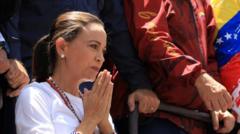María Corina Machado, who was barred from running for office, has managed to unite the opposition
Vanessa Buschschlüter
BBC News
The Venezuelan attorney general, a close ally of President Nicolás Maduro, has announced he is investigating opposition leaders María Corina Machado and Edmundo González for alleged “incitement to insurrection”.
The opposition leaders had earlier called on the security forces to “side with the people” and ignore any orders to repress the anti-government protests.
Tension has been running high since the electoral authority, which is closely aligned with the government, declared Mr Maduro the winner without making detailed voting tallies public.
The opposition has uploaded copies of the voting tallies as evidence that it was Mr González and not President Maduro who won the election.
Image source, Reuters
Edmundo González and his team have uploaded copies of the voting tallies to the internet
On Sunday, the Washington Post said it had reviewed more than 23,000 of the tally sheets collected by the opposition, external – which amounts to 80% of voting machines across Venezuela.
The Post concluded that Mr González had “likely received more than twice as many votes as President Nicolás Maduro”.
On Monday, the opposition published a statement on X stating that Mr González had won 67% of the vote compared to Mr Maduro’s 30%.
The statement, signed by both Mr González and Ms Machado, said the opposition had achieved an “overwhelming victory”.
It is at odds with the result announced by the CNE, which declared Mr Maduro the winner with 52% of the vote against 43% for Mr González.
The opposition statement elicited an immediate response from Attorney General Tarek William Saab, who accused the pair of “falsely announcing an election winner different to the one proclaimed by the National Electoral Council (CNE)”.
He said the statement also “openly incited officials from the police and military to disobey the laws”.
Mr Saab added that he had decided to open a criminal investigation against both opposition leaders.
Mr González and Ms Machado have been in hiding since last week after a leading government figure said they should be jailed.
Ms Machado emerged briefly from hiding on Saturday to address a mass opposition rally in the capital, Caracas, telling them that the Maduro government had “lost all legitimacy”.
Her supporters greeted her with shouts of “freedom, freedom”.
Reacting to Mr Saab’s statement, the European Union urged Venezuela on Tuesday to cease intimidating the opposition.
“This needs to stop. We are calling on the authorities to stop this, this campaign of intimidation of the opposition and judicial intimidation,” and EU spokesman said.
The EU had earlier had earlier called “on Venezuelan authorities to put an end to arbitrary detentions, repression and violent rhetoric against members of the opposition and civil society, and to release all political prisoners”.
The EU had stated on Sunday, external that “without evidence to support them, the results published on 2nd August by the CNE cannot be recognised”.
It is just one in a long list of organisations and countries which have demanded that the CNE make the detailed voting tallies public.
Last week, Mr Maduro asked Venezuela’s top court, the Supreme Tribunal of Justice (TSJ), to audit the voting tallies with a view to confirming the results provided by the CNE which handed him another six-year term in power.
But this move has caused concern as the TSJ’s justices are overwhelmingly government loyalists.
The opposition fears that it is a delaying tactic aimed at deflecting pressure from the CNE.
On Monday, CNE head Elvis Amoroso said he had handed over “all the documents requested from him him” by the Supreme Tribunal of Justice (TSJ).

